|

by Ben Potter
November 01, 2024
from ClassicalWisdom Website
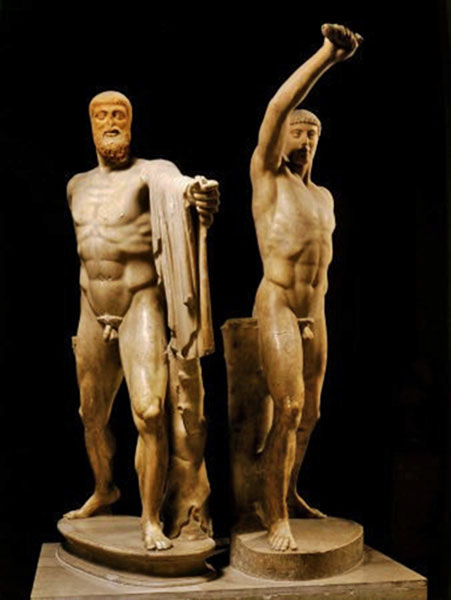
Harmodius and
Aristogeiton
Discover Athenian democracy’s
surprisingly bloody origins,
how it functioned,
and what lessons its use (and
abuse)
have for us today...
Athens, July 514 BC.
Two of Athens' most disgruntled sons,
Harmodius and Aristogeiton become forever known as
'The Tyrannicides'.
With their swords plunged into the Tyrant
Hipparchus, these two soon-to-be martyrs become the symbol
of Athenian democracy.
This is because these brave men's actions paved
the way for Athens to unfetter herself from oppression and tyranny.
Her screaming infancy was at an end:
it was finally time for the demos
(people) to unleash their kratos (power).
So harmony and joy ensued in what was now the
cradle of democracy?
No.
Not at all.
Not even slightly...
Two issues rise starkly out of the noble intentions of our
forefathers; the system... and the results.
But let's deal with the latter first, to see if
any means can justify such ends...!
Athenian democracy, despite a couple of interruptions and
renaissances, is generally agreed to have reigned supreme from
508-322 BC.
Those who know their important dates will see an instant red flag:
Didn't King Alexander the Great die in
323 BC?
How could Athens remain an independent,
democratic state while under the yoke of Macedonian imperialism?
A very intelligent question; you should
congratulate yourself for asking it.
Whilst Athens remained a functioning democracy during the reign of
Alexander the Great, it could not in all earnest be called
independent.
In other words, it was a democratic client
kingdom that could have easily had its powers removed should they
have been used 'irresponsibly' (c.f. American involvement in
Guatemala, Iran, Chile, Brazil, Argentina and even Greece itself).
Despite this technical independence, Athenian democracy did little
to cover itself in glory... even when its self-determinism was
tangible rather than merely theoretical.
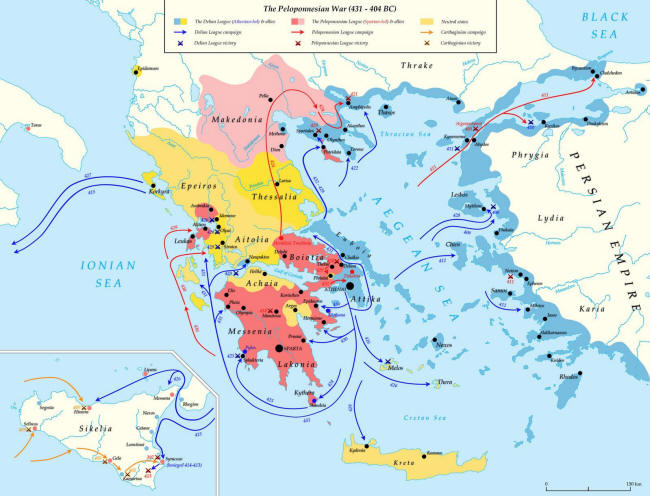
Peloponnesian War
For instance, the bloodthirsty rule of the people forced Athens to
hubristically overstep her reach during the Peloponnesian War
(431-404 BC), which resulted in the temporary suspension of the
democratic experiment.
Importantly, it also seemed suspicious of, and
hostile towards, some of the greatest minds of that time.
Indeed, such was the poor judgment of the demos that it drove the
city's greatest commander (and lover), the legendary Alcibiades,
to flee during the Peloponnesian War and take up residence with
their antagonists, the Spartans.
It has been often speculated, and with much justification, that
Alcibiades' defection was the tipping point in the war.
However, national security was only one sphere in which the people
strove to raise their own standing simply by reducing the mean
quality of the demos as a whole. Art and philosophy were the chief
victims of a short-sighted and covetous populace.
It's thought that popular pressure and threat of persecution forced
the tragedian Euripides to quit the city for a 'retirement'
in Macedonia.
Though some now dispute the veracity of such a
story, the mere fact that it was popularly believed tells a tale in
itself.
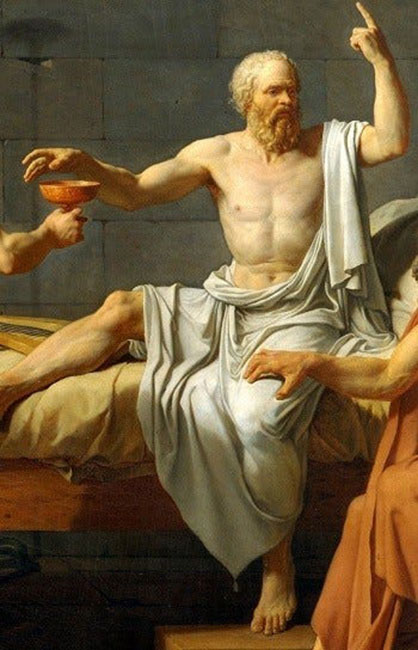
Death of Socrates
Aristotle, likewise, opted to jump before he was pushed into
the next world. He was particularly concerned that the demos would
condemn him to the same fate it bestowed upon Socrates.
Unlike the other three men mentioned above, Socrates was not merely
chased out of town, but actually executed by a jury of 501 of his
peers, greatly multiplying Herbert Spencer's maxim that,
"A jury is composed of twelve men of average
ignorance"...
It is this state-sanctioned murder of one of the
first great minds of our culture that forever leaves Athenian
democracy with an indelible stain.
But can the means do much to exonerate such rancorous ends? Well...
you be the judge.
The Nuts and Bolts
Athenian democracy evolved as any 'work in progress' democracy
should and as such the citizens contributing to the various bodies
of state had sometimes more and sometimes less involvement/power at
different times.
However, the really poignant thing about political participation is
that it was a) assumed and b) direct.
It was taken for granted that men must not merely take an interest
in or talk about politics, but perform actively within the political
arena.
Indeed, men who deliberately spurned politics
were known as idiōtēs.
While the word literally meant 'one who
minded his own business', it was a term of the utmost disdain.
It's from this insult that we get the word
"idiot".
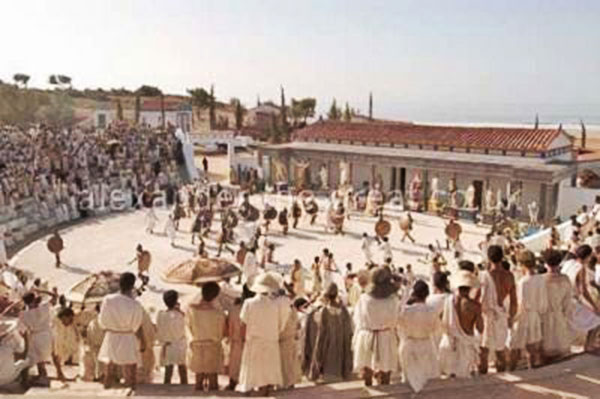
Assembly
The idea that democracy was 'direct' meant that the votes in the
Assembly (ekklêsia) were de facto referenda.
Though minor votes seemed to be able to get
through without much difficulty, major votes could only be passed if
6000 men were in attendance.
Motions carried with a simple majority.
All free men over 18 could vote, but due to the two years of
compulsory military service, political activity usually started at
the age of 20. Women had to wait a bit longer... until 1952 in fact.
However, this imbalance was slightly redressed by
the fact that men had to be 30 in order to hold political office,
sit on a jury or even table a motion!
The Boule
Despite its selectively egalitarian nature, the referendum-style
Assembly was by no means a political free-for-all.
The business of the day was dictated by the
Council (boule). This 500 strong body was the nearest thing that
Athens had to an executive or cabinet.
Even if there was no guarantee that the Council would be selected
judiciously, it was at least selected randomly.
50 members of each of the 10 Athenian tribes
(demes) were appointed by lot to serve for a year with members
from alternating tribes taking turns to lead the Council
day-by-day.
The boule also had to maintain the fleet,
liaise with the generals, entertain dignitaries, assess the
competence of magistrates and handle the city purse.
These last two responsibilities did, for a time
at least, fall in part under the remit of other organs of state.
The Courts
One of which was the courts.
6,000 judges were appointed a year and they
would congregate in the agora to be assigned trials for the day.
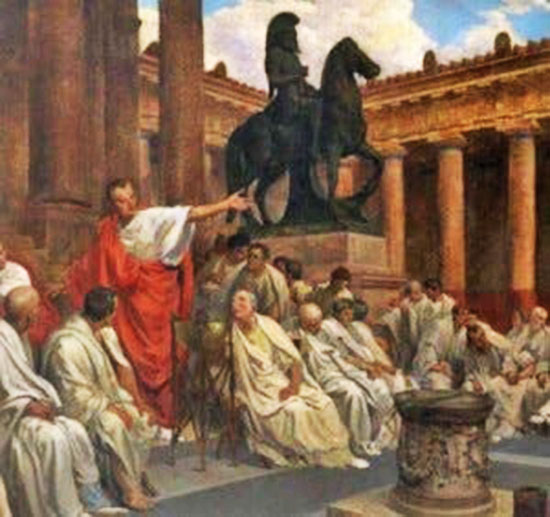
Private cases were overseen by either 201 or 401 judges and public
cases by 501.
Trials were supposed to be concluded by sunset,
making jury tampering and corruption not only extremely costly, but
logistically impossible.
The most serious public cases seem to have been political in nature
and were brought against those charged with treason, corruption, or
those who proposed unconstitutional legislation in the Assembly.
N.B.: it didn't matter if the legislation had passed
the vote, the individual could still be tried, condemned and even
executed for misleading the demos.
The demos was always immune from any form
of accountability, if it acted incorrectly it was always because it
had been 'misled'.
The Archai
The day-to-day running of the mundane affairs of state was in the
hands of the 1,200 archai.
1,100 of these former-day civil servants were
chosen by lot with a further 100 being voted for by the Assembly.
Only those voted in could hold the same office
twice (with the exception, by numerical necessity, of those who went
into the boule).
The Strategoi
The only offices not attainable by lot were the 10 associated with
the armed forces.
Consequently, these generals (strategoi) were
the only people who could hope to carve out a political niche
for themselves.
However, such an appointment was fraught with
peril, as the demos was notoriously unforgiving of failure.
The case in point being the 406 BC defeat at the
battle of Arginusae.
Six of the eight generals involved in this
débâcle were tried en masse and executed, despite such a process
being illegal.
The leader in charge of proceedings for the day of the vote was,
amazingly (as it was random which citizen it could have been),
Socrates.
Despite refusing to allow an illegal vote to
take place, the demos went ahead and committed collective
treason against itself.
Some speculate that the enemies Socrates made on
that day may have come back to haunt in him in 399 BC.
The Demokratia
The democrats of Athens believed that demokratia was
intrinsically bound to liberty and equality; they defined the terms
thus:
Liberty = the ability to live as one pleased
and the freedom to participate in politics.
Equality = the right to speak in the Assembly and the right to a
fair trial.
There was not even a suggestion of attempting to
provide men with an equal social or financial status:
democratic Athens was actually extremely
snobbish and elitist.
Free-speech (parrhesia) was thought to underpin
both of these.
Though many critics have pointed out exercising
this was precisely what cost Socrates his life.
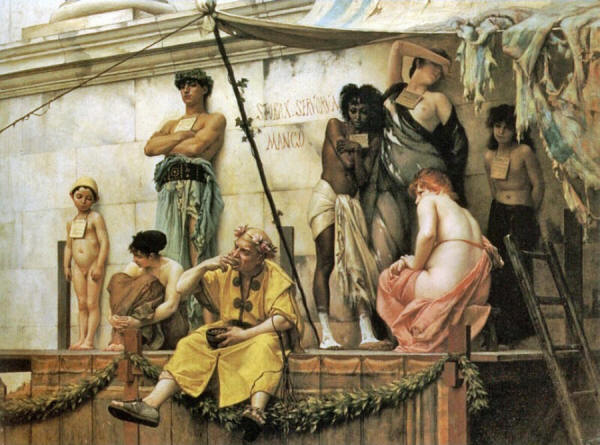
Slavery
Critics have also claimed that, in order to financially sustain such
a democracy, it was necessary for Athens to extend (and then
overextend) her imperial reach.
This included having a slave class
whose ranks were swollen far beyond those of any of her close
neighbors.
Additionally, as the demos could act with impunity, when
mistakes were made - scapegoats needed to be found (e.g. the 6
generals or Socrates).
That said, this was a political system without entrenched parties.
Indeed, it was with few factions of any sort, with minimal
corruption and, most importantly, without any concept of lobbyists!
And we cannot deny that the democratic period gave us some of the
most amazing tragedians, comedians, philosophers, architects,
visionaries, historians and characters the ancient world ever
produced.
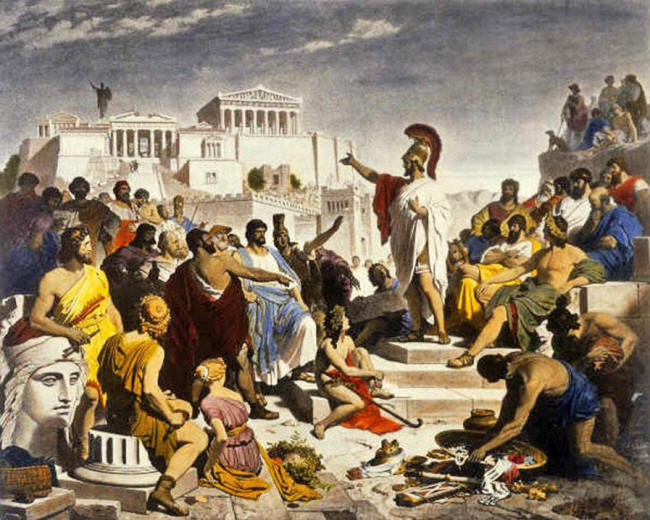
Parthenon
Would we have had the Parthenon if not for
Pericles and his building plan?
Or Aeschylus, Sophocles,
Euripides and Aristophanes if theatrical festivals,
competitions and prizes were not organized by the demos...?
Also, perhaps that inevitable product of
democracy, bureaucracy, is why this period of history is one with
such relatively fine records.
The importance of posterity was such that even
the ignominy survives.
Would a king or an oligarchy have been so
transparent?
Ultimately the question must be one of
self-determinism:
were the ancient Athenians content to preside
over the first functioning democracy the world has ever
known...?
Well, the fact that they made Democracy a
goddess in the 4th century BC certainly suggests they
had strong feelings towards its retention.
As does the fact that they relinquished it so
very reluctantly.
One can imagine that, when the Macedonians
wrenched democracy away from the clawing grasp of the demos,
tear-drops, much like the blood from the Tyrannicides' blades
would have salted and stained the terrain at the foot of the
Acropolis...
|








